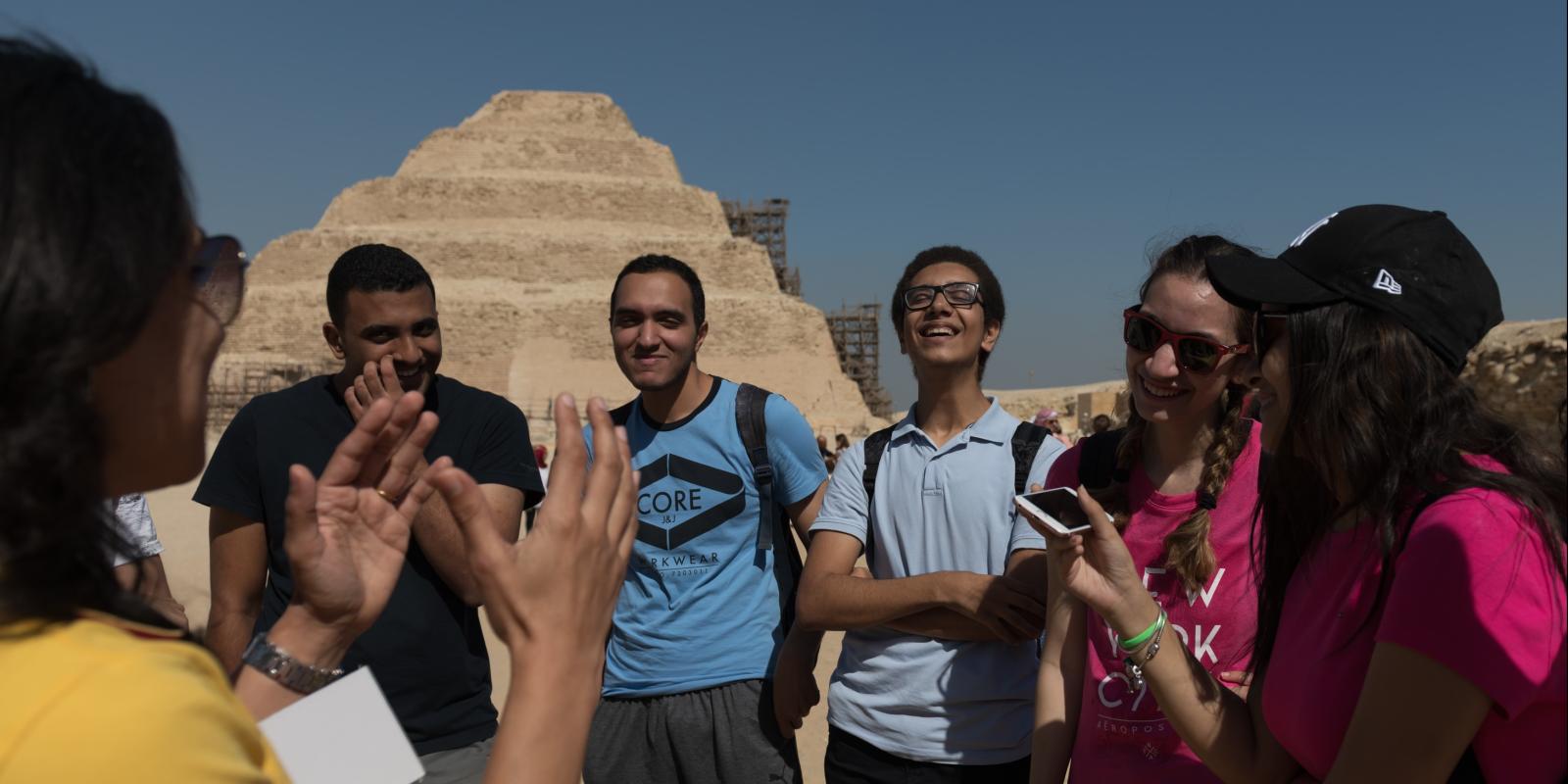
Tomb Raiders: Students Learn Firsthand About Antiquities Theft
Focusing on antiquities theft in Egypt and around the world, students in the Core Curriculum class, Loot: The Research for Buried Treasures in Egypt and Beyond, gained hands-on experience in Egyptology through visits to historic sites.
Offered for the third semester, the course encourages students to preserve their own cultural heritage by learning more about it through readings, presentations, activities, field trips and conflict resolution.
But why looting?
“I got interested in this topic when I was doing research for a novel,” said Gretchen McCullough, senior instructor in the Department of Rhetoric and Composition who designed this course. “Theft of antiquities became a huge issue after the Arab Spring and the security breakdown. But then, I realized this was not only a big issue in the Arab world, but also in Turkey, Greece and so many other countries.”
McCullough added, “This course focuses on how antiquities intersect with issues of cultural identity and ownership. We decided to run it as a course within the Core Curriculum, and since there are so many things to see, we added field trips as part of the course. One semester, we went to Ibn Tulun, Sultan Hassan and Refai [mosques], and Coptic Cairo.”
Mariam Habib, who is currently enrolled in the course, appreciates the chance to complement her interest in history with knowledge on this topic. “The theme of looting was interesting and eye-catching to me from the beginning, especially because I've always been interested in history and the importance of antiquities,” she said. “What I like most about the course is the fact that we learn so much about the different methods of looting, how looters think, how antiquities are smuggled and the importance of cultural identity.”
Kathleen Saville, senior instructor and associate chair of the Department of Rhetoric and Composition who is currently teaching the course for the first time, is enjoying the course and how the students get to know their own culture and visit its historical sites, which they might not have had the chance to visit before.
“Despite being a foreigner, I’ve gone to more sites than any of my students,” she explained. “Maybe this course will engender some interest in the students who’d like to study Egyptology.” Said Saville. “Only a few of the students have been to the pyramids for example, so we are working on helping them to know more about their country. We already went on a field visit to Saqqara.”
Monica Hanna ’04,’07, who studied Egyptology at AUC and received the SAFE [Saving Antiques for Everyone] Beacon Award one (SAFE) for her tireless efforts to publicize and expose the rampant looting of Egypt’s ancient Egyptian, Coptic and Islamic archaeological sites, was invited as a guest speaker during the class, talking to the students more about the dangers of looting antiquities and giving real-life examples.
“This is an excellent course,” said Hanna. “It keeps the students engaged and very-well informed. They actually built a solid background and arguments about the topic, which means that the content of the course is really strong. It’s not an abstract course. It’s very hands-on and triggers the students’ enthusiasm to learn and know more about their own heritage.”
According to Saville, the students were as much impressed with Hanna’s arguments and knowledge as she was with their enthusiasm. They were eager to know more about the real-life problems that the theft of antiquities might cause.
“The students were pretty impressed when Hanna explained how the mafia uses young children in the sites to help them search for antiquities because they can wiggle down in the tunnels,” said Saville. “Sometimes they destroy the sites, and sometimes the sites actually collapse on top of these kids and kill them.”
“There is a huge black market in terms of antiquities, and it’s often tied with the mafia,” added McCullough. “There are families in Upper Egypt who make their living by stealing antiquities.”
An added value of the course and its importance to the students is learning to not only preserve their heritage, but also to value it as part of their own individual identity. “The course has taught me so many things that now I look at antiquities and looting in a very different way than I used to.,” said Habib.
